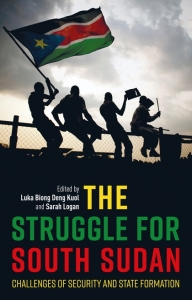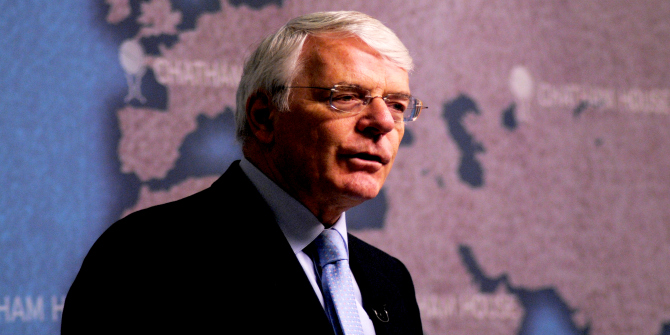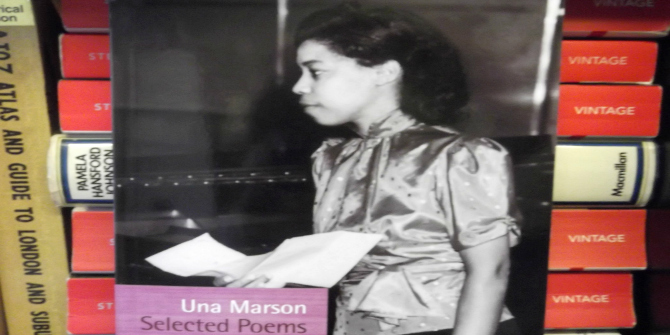In The Struggle for South Sudan: Challenges of Security and State Formation, editors Luka Biong Deng Kuol and Sarah Logan bring together contributors to offer an analysis of South Sudan’s path towards independence and the challenges it has faced since. Charting new ways of confronting the present while showing deep understanding of the impact of past events, this book is highly recommended by Kodili Chukwuma.
The Struggle for South Sudan: Challenges of Security and State Formation. Luka Biong Deng Kuol and Sarah Logan. I.B. Tauris. 2019.
This collection, edited by Luka Biong Deng Kuol and Sarah Logan, with interlocutors and contributions from other experts on South Sudan, offers a searing analysis of the (un)becoming of one of Africa’s newest states. Although South Sudan shares many similarities with most states in the continent, which may include the fixity, manipulation and (mis)application of ethnicity in state formation, the volume draws out the country’s unique trajectory through an extensive interpretation of the conditions peculiar to South Sudan.
To this end, The Struggle for South Sudan is divided into thirteen chapters which could effectively be divided into three sections for the purpose of this review. The first part, comprising Chapters One and Two, explores the current realities in South Sudan by delving into the pre-colonial and colonial archive as well as the post-independence situation in order to postulate some possibilities amid the present chaos. The second section, from Chapters Three-Ten, interrogates the system of government, which primarily entails debate on how to manage ethnic division either through federalism or/and decentralisation. The final section explores economic activities in South Sudan, as well as the problems facing state bureaucracies and energy challenges.
In the first chapter, Naomi Pendle explores the possibility of reimagining a new nation, in spite of competing ethnic subjectivities, through the use of customary law. Although customary law is one of the vestiges of British colonialism in Sudan, crystallised by the forceful homogenisation of disparate groups which serves to marginally distinguish the South from the Muslim North (Sudan), it remains essentially fluid. This has led to multifarious interpretations and contestations in post-independence South Sudan. As such, the government of the Sudan People’s Liberation Army/Movement (SPLA/M) unimpressively resort to this old colonial logic in order to hold power instead of fostering the development of new norms.
Furthermore, Peter H. Justin and Lotje de Vries draws on socio-anthropological fieldwork to demonstrate the further imbrication of ethnic identities along territorial boundaries which deepens rivalry, especially in the control of state resources. Markedly, disputes over land ownership and resource control hinder economic activities, as seen in the case of Mangalla Payam where land disputes between the Bari and Mundari ethnic groups have stalled agricultural and industrial activities. Also, the arbitrary redistribution of ethnic communities subverts the process of nation-building as local chiefs often exploit these margins for personal or group interest. That said, this book missed the opportunity to critique the often taken-for-granted fixity of these ethnic categories, and this often leaves the analysis rather descriptive.
 Image Credit: Cropped image of the South Sudan flag (Timothy McKulka/USAID in Africa Creative Commons License)
Image Credit: Cropped image of the South Sudan flag (Timothy McKulka/USAID in Africa Creative Commons License)
The next section of the collection looks at the political processes in South Sudan. Francis M. Deng and Daniel J.M. Deng, for example, interrogate the extent to which diversity can be managed through a constitutional arrangement, noting that the extant constitution of South Sudan, as with most postcolonial African states, is a product of the former colonial power. In view of this, they argue that a process of constitutionalism anchored in a bottom-up formulation of new values will assist in managing the constellation of ethnic subjectivities.
As with the constitution, the voting system and the centralised system of government attempt to forcibly flatten out ethnic diversity by superimposing the will of the SPLM government. Although South Sudan operates a mixed system of voting, it is constantly open to executive manipulation. Its bloated legislature also constitutes a significant drain on the overstretched economy. At the same time, the presidential system of government, with few checks on the powers of the president, encourages excessive concentration of power at the centre. All these factors have led to resurgent calls for federalism, which often reduce to the desire for ethnic self-determination. Kuol, for example, posits that the debate on federalism can be crudely divided into two periods: the pre-Comprehensive Peace Agreement (CPA) era that led to a power-sharing agreement between the Government of Sudan and the SPLM/A; and the post-independence (2011) period, following renewed agitation to resist any attempt to concentrate power at the centre.
In Chapter Six, Douglas H. Johnson takes a critical look at the meaning of federalism, which remains elusive in the political discourse of South Sudan. He concludes that the failure to imagine a new community beyond ethnic filiations, coupled with a fractured history that exacerbates fear of survival and the manipulative tendencies of South Sudan’s leaders, contributes to the misapplication and misappropriation of federalism. At each turn, federalism could either mean self-determination in opposition to rigid homogenisation; on the other hand, federalism as expressed in public discourses, especially in Juba, known as Kokora, has come to represent the ‘division’ of South Sudan along ethno-linguistic lines.
John Young, for example, asks in Chapter Seven whether the Ethiopian model of ethnic federalism could be adapted to South Sudan. This model, as implemented by the Ethiopian People’s Revolutionary Democratic Front (EPRDF) government, gives full recognition to ethno-linguistic groups and creates a distinction between nation and nationalities. However, the political economy of South Sudan, which is primarily pastoral, as well as the lack of political will and regional inequality, makes ethnic federalism not only impractical but also antithetical to the solution in that it further solidifies these ethnic categories. In light of this, Young concludes that South Sudan must look inwardly for solutions and think less about adopting established models. That said, Johnson and Young could have explored how federalism in global governance repertoire blurs into South Sudan’s political imaginary, especially through the activities of think tanks and Western government agencies.
Chapters Eight to Ten confront the question of decentralisation as a panacea for managing ethnic differences. Joseph Siegle and Patrick O’Mahony, while acknowledging that there are different paths to decentralisation, argue that certain felicitous conditions are necessary, including accountability, legitimate government and an effective relationship between the centre and the sub-national. Some of these conditions are either absent or inversely applied in South Sudan. For example, Alex de Waal and Naomi Pendle demonstrate how President Kiir employs deconcentration to consolidate power at the centre by co-opting rival groups and creating more states (from 10 to 28 and later 32), thereby entrenching a system of patronage.
The final section of this book explores the economic situation, the debilitating bureaucratic structure and the energy problems facing South Sudan. Chiefly, the depreciation of the South Sudanese Pound and high inflation are visible signs of its deteriorating economy. Although the government have introduced spending cuts and removed subsidies from petroleum products, Utz Pape and Nora Dihel argue that South Sudan lacks the necessary institutions to pursue a monetary-based stabilisation and instead should look towards ‘dollarisation’ to control its exchange rate fluctuation.
In Chapter Twelve, Barbara Nunberg draws our attention to the lack of an effective civil service, which constitutes a significant limitation to statehood. To elaborate, in spite of the significant increase in employment figures, this has mostly occurred in security-related positions instead of other service areas like health and education that have greater impact on the society. Finally, David Mozersky and Daniel M. Kammen discuss the use of renewable energy as an alternative to fossil fuels. As such, utilising donor contributions, they argue, will enable South Sudan to improve energy production and distribution to ‘strategic sites’ such as NGO buildings, hospitals and Internally Displaced Persons (IDP) camps. Nevertheless, the authors do not demonstrate how renewable energy could be used as a tool for nation-building by increasing access to renewable energy without unnecessary construction of binaries on the basis of ‘who can use and who cannot’. Again, emphasis on ‘donor contribution and dollarization’ may extend South Sudan’s tenure of dependency.
All in all, The Struggle for South Sudan foregrounds most of the debates on the state and is highly recommended to anyone who is serious about engaging with these issues. It investigates the current situation in South Sudan with an emphasis on the past as it attempts to chart new ways of confronting the present and possibly even invent new possibilities.
Kodili Chukwuma is a PhD candidate and Associate tutor in the School of Politics, Philosophy, Language and Communications at the University of East Anglia. He holds a Masters degree in International Politics from the University of Hull, UK, and a BA in History and International Studies from the University of Ilorin, Nigeria, where he finished as the Best Graduating Student. His research explores Nigeria’s use of softer forms of counter-terrorism in addressing Boko Haram terrorism.
Note: This review gives the views of the author, and not the position of the LSE Review of Books blog, or of the London School of Economics.


 Find this book:
Find this book: 





Nice review Chukuma,
I would love to read the book some time.
However, I am of the opinion that the major problem of South Sudan lies in Leadership motives and corruption. It’s almost unimaginable that they found themselves in the same political crisis they were running away from when they ceded from Sudan. The leaders, not until recently show more interest in keeping their seats than finding ways to move the young nation forward.
If the leadership change their motif, it would be easier to find solutions to the impeding challenges confronting the country.